This is a simple visual narrative highlighting the importance of a now-disappearing board game and the rich mythological references that are associated with it.
चौसर का है खेल निराला,
कहीं कहांनियों में है यह दोहराया, अब खेलते हैं हम वही खेल।
बस नाम अलग ,रूप अलग, पर वही है यहां मेल ।
चौसर का खेल है निराला
पर
महाभारत जैसा घमासान युद्ध शुरू कर डाला ।
एक था शकुनी जिसके पास था जादुई रईस
जिसने पूरे खेल का रुख ही बदल डाला ।
युधिष्ठिर बाजी लगाता गया और शकुनि के कपट से एक-एक करके सब्धन सब धन दौलत हारता गया।
चौसर का खेल है निराला
पर
महाभारत जैसा घमासान युद्ध शुरू कर डाला
एक एक करके युधिष्ठिर लगाता गया अपने भाइयों की बाज़ी।
पर पीछे हटने के लिए वह नहीं था राज़ी ।
चौसर का खेल चलता गया और वह सब हारता गया।
चौसर का खेल है निराला
पर
महाभारत जैसा घमासान युद्ध शुरू कर डाला
पांडव कभी हारते नहीं खेल से कभी भागते नहीं
ऐसा बोलकर शकुनि ने उसे और बढ़ाया
युधिष्ठिर ने अब द्रौपदी को दाव पर लगाया
चौसर का ही खेल है निराला, छल से अब अपने पत्नी को भी खो डाला. कृष्ण ने द्रौपदी का हरण होने से बचाया
धृतराष्ट्र ने पांडवोंको उनको खोया सामान लौटाया।
चौसर का खेल है निराला
पर
महाभारत जैसा घमासान युद्ध शुरू कर डाला
एक बार खेल के युधिष्ठिर को समझ ना आया,
कौरावों के नियोते पर वह फिर चला आया.
चौसर का खेल था निराला
शकुनि के कपट से , इन्होंने सब खो डाला.
भेज दिया पांडवों को चौदह साल वनवास,
ऐसे हुई महाभारत की शुरुआत।

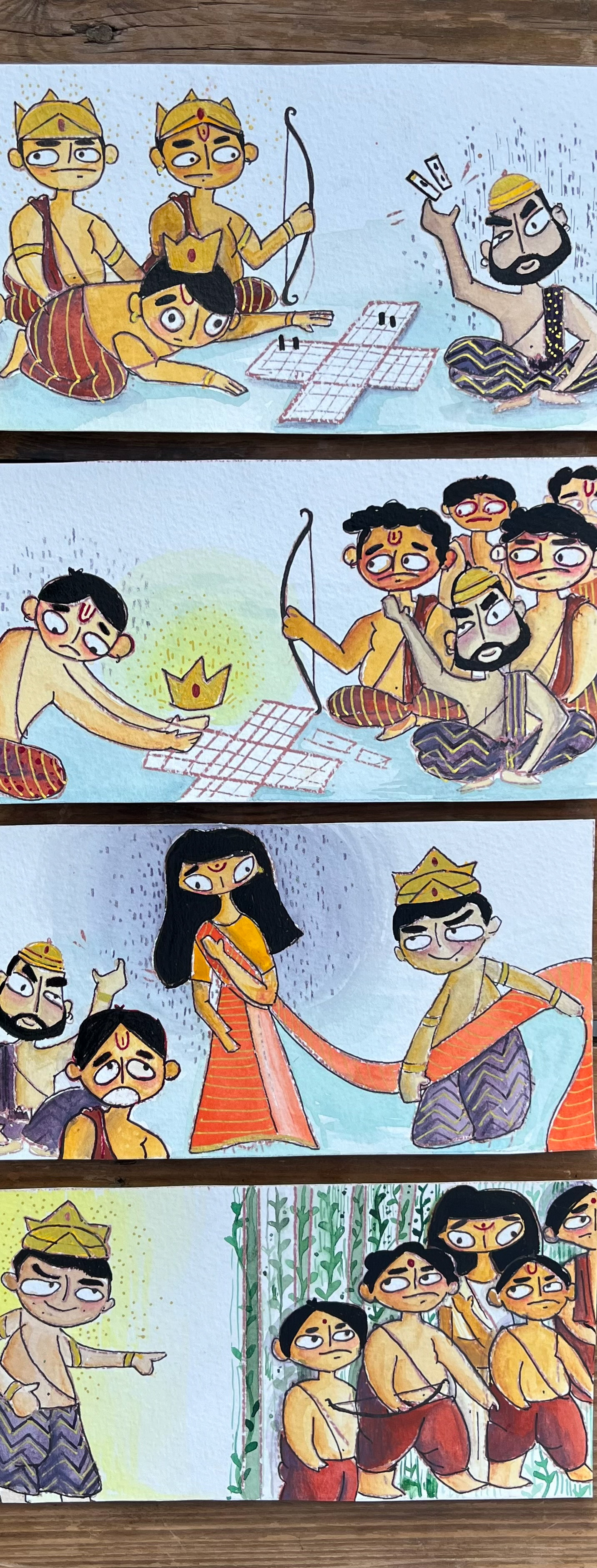
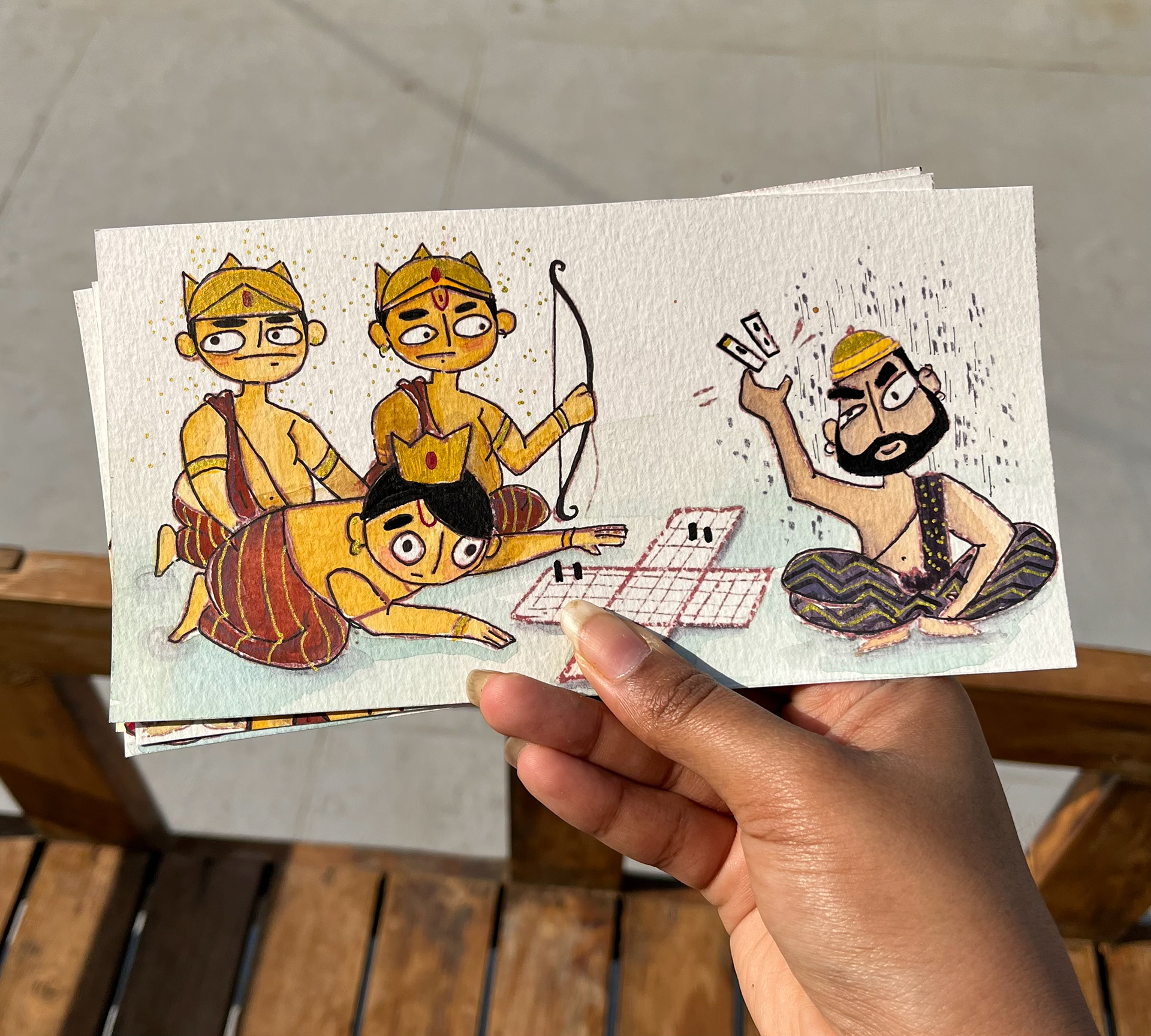
This 5 verse poem talks about how Shakuni mama, one of the antagonists of the Hindu epic Mahabharata, was blessed with a magical dice that enabled him to manipulate the game of chauras.
The story unfolds with Pandavas being invited to a game of Chauras. They are unaware of the evil vengeance plotted by Kauravas.
Yudhishthira, who had a weakness in playing dice, accepts their cousin's invitation. All five Pandavas, alongside Draupadi, go to Hastinapur for the glorious game of dice. The game began, and Duryodhana announced, “Shakuni, my uncle, will play for me".Everyone knew about Shakuni's magical dice. How will that be fair? Pandavas will lose the murmur spread across the hall. Wisely Duryodhana asked, Have you lost your courage?
Pandavas were known never to say no. And hence the game began; Yudhishthira bet his horses, elephants, and various other things. Every time Shakuni threw the dice, he got what he desired. The game continued, and Yudhisthira lost his army, his wealth, his personal jewels, and his brothers too. The game continued. Yudhishthira rolled the dice and lost himself. The Kauravas roared with joy. Pandavas became their slave; tempted to win it all back, Yudhisthira put Draupadi, his wife, at stake. All was lost, and Duryodhana publically Humiliated Draupadi by disrobing her. Krishna, who had sworn to protect Draupadi, came to her rescue. The game was called off, and after seeing how Draupadi was humiliated, Dhritarashtra called off the game. Yudhisthira was sent back to Indraprastha with everything he had lost.
Kauravas later invited Yudhisthira again for another game of dice. Letting off what happened earlier, Pandavas went to Hastinapura, yet history repeated itself. Yudhisthira lost everything and was sent away for 14 years, Vanvas. and that is known to be the start of Mahabharata
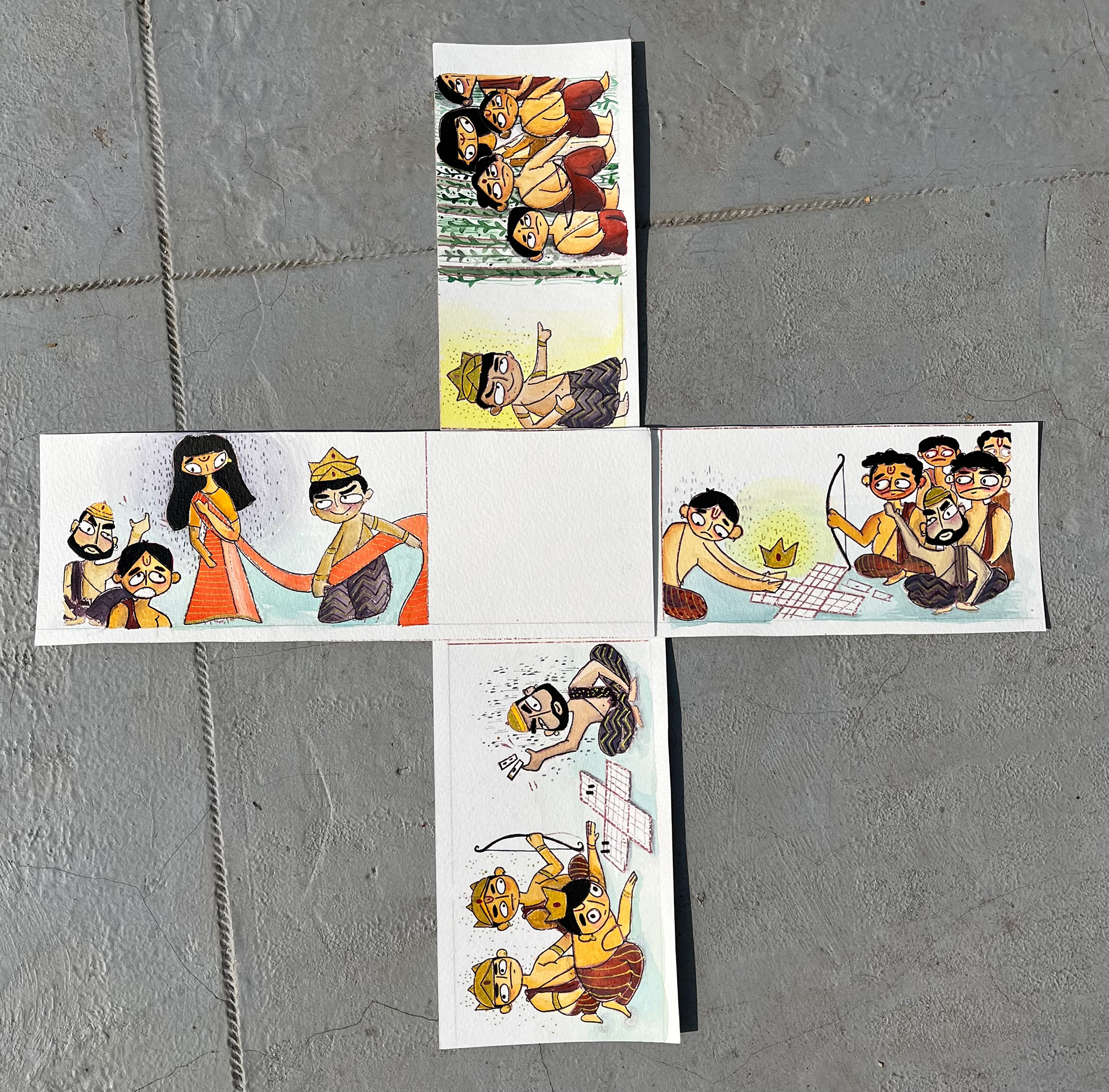
Research and ideation
I created a simple visual narrative about Chauras or Chaupar and how Mahabharata took place.
The narrative is visualized in a very simple, illustrated way, using an earthy color palette. These visuals are kept minimal to support the narrative highlighting the game and how the events unfolded.
The vernacular poem, written in Hindi, uses a lot of repetition and has a rhyming scheme to make it more engaging and easy to grasp.
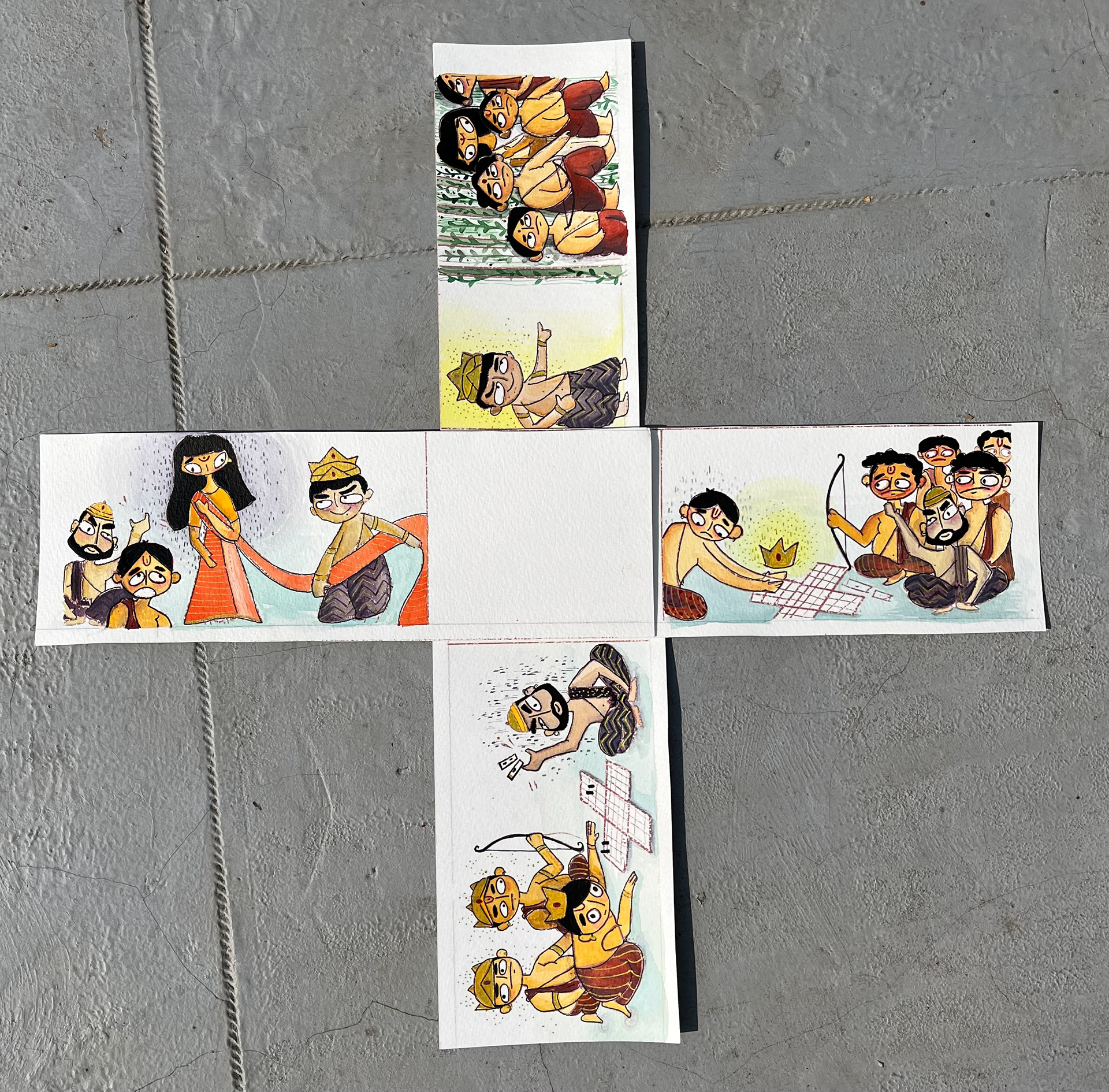
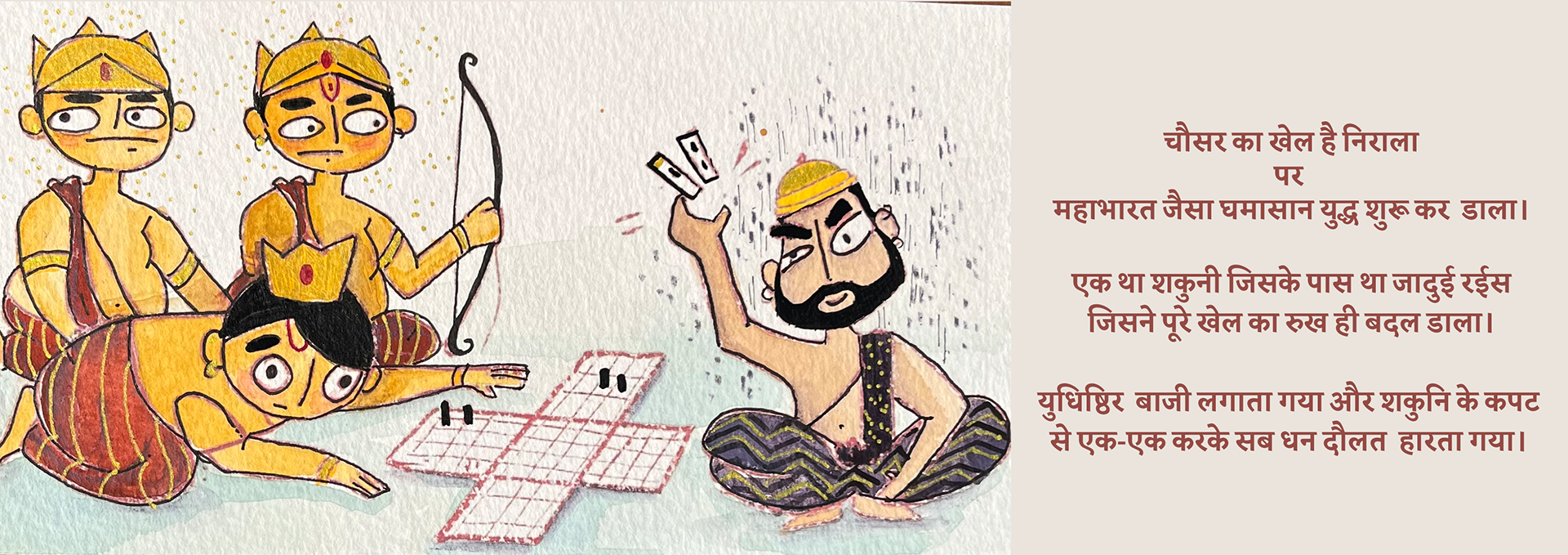
The visual story panels can be laid out in a form that resembles the actual game of chauras. To make the audience aware of this ancient board game while introducing them to mythology.
Target audience: youth and children, as they are most interested in stories and should know about these disappearing games and the mythology associated with them.